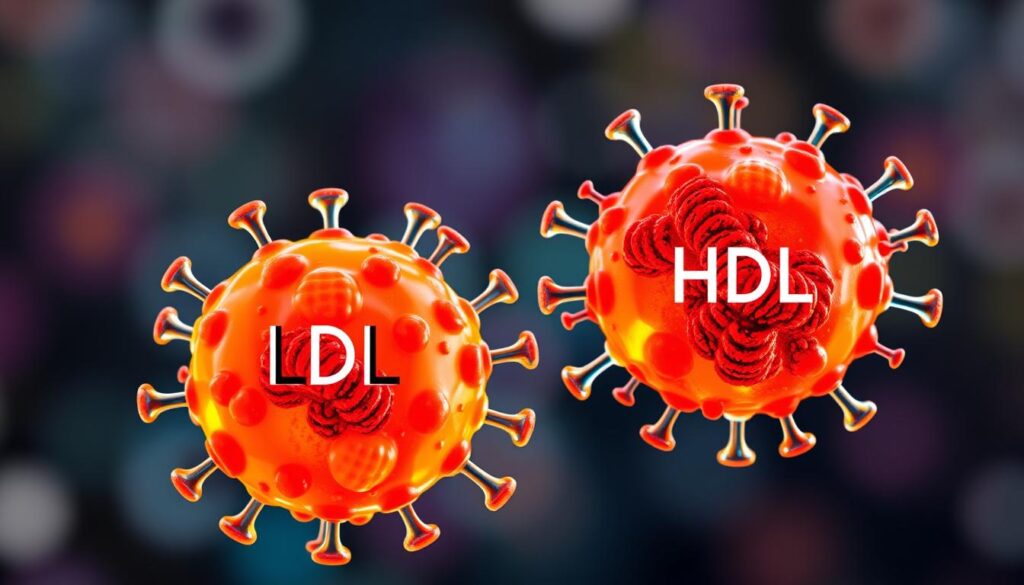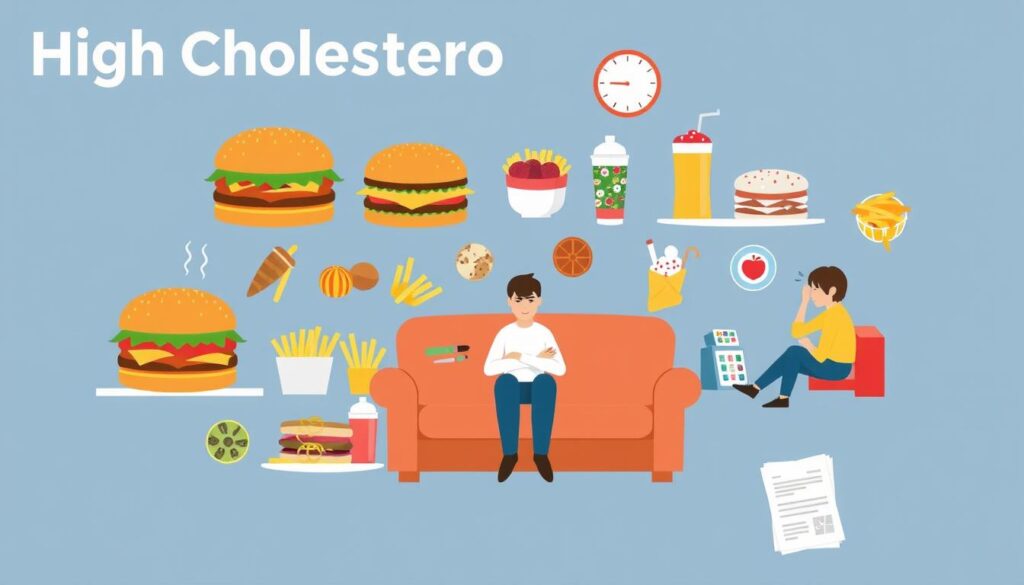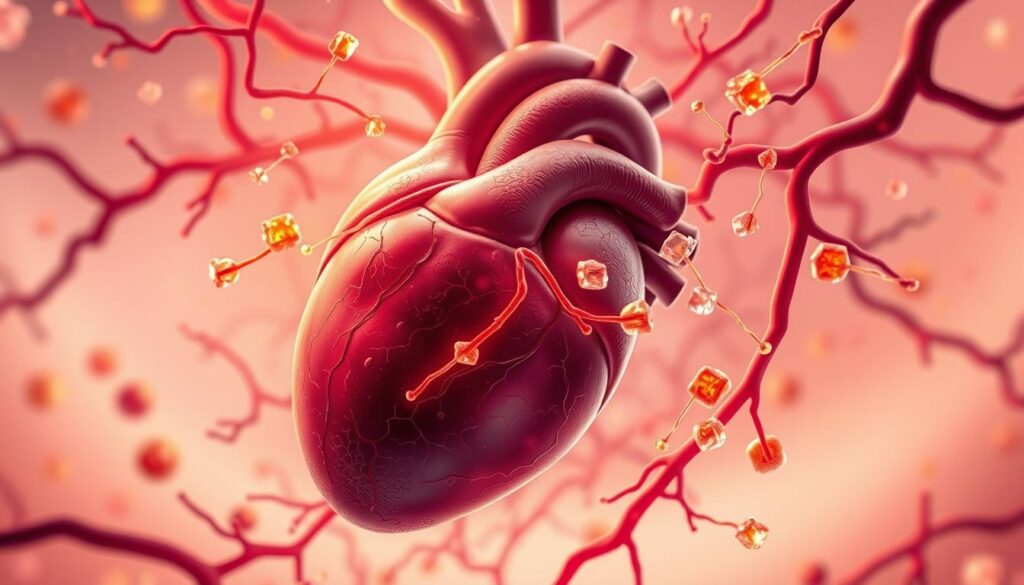Is high cholesterol a threat to your heart health? Cholesterol is essential for our cells, but too much can be harmful. Let’s explore high cholesterol, its causes, symptoms, and treatments to protect your heart.

High cholesterol is often called the “silent killer” because it can harm your heart without warning. Knowing about cholesterol types, triglycerides, and normal ranges is key. By understanding causes and taking action, we can keep our cholesterol in check and lower heart disease risks.
Understanding High Cholesterol and Its Impact on Health
Cholesterol is vital for our bodies, but too much can be harmful. Let’s look at the different types of cholesterol and their roles.
Different Types of Cholesterol: LDL vs. HDL
LDL (low-density lipoprotein) cholesterol is often called the “bad” cholesterol. It can clog arteries, leading to heart disease and stroke. HDL (high-density lipoprotein) cholesterol, or the “good” cholesterol, helps remove LDL. This reduces the risk of heart problems.
The Role of Triglycerides
Triglycerides are fats in the blood that affect heart health. High levels, linked to bad diets and lifestyles, can cause artery buildup. This is called atherosclerosis.
Normal Cholesterol Range Guidelines
Knowing the right cholesterol levels is key to a healthy heart. The American Heart Association suggests these levels:
- Total cholesterol: Less than 200 mg/dL
- LDL cholesterol: Less than 100 mg/dL
- HDL cholesterol: Greater than 60 mg/dL
- Triglycerides: Less than 150 mg/dL

“Maintaining a healthy cholesterol balance is crucial for overall heart health and longevity.”
Common Causes of High Cholesterol
High cholesterol is a big health problem. It raises the risk of heart disease and stroke. Knowing what causes high cholesterol is key to preventing and managing it. Let’s look at the main reasons for high cholesterol.
Lifestyle Factors Contributing to Elevated Cholesterol
Some lifestyle choices can raise cholesterol levels. Eating too much saturated and trans fats and not being active can harm. Smoking and drinking too much alcohol also affect cholesterol.
Genetic and Medical Conditions
Genetics can greatly influence cholesterol levels. A genetic disorder called familial hypercholesterolemia can cause very high LDL cholesterol. Certain health issues like hypothyroidism, diabetes, and kidney disease can also raise cholesterol.
Age and Gender Considerations
Cholesterol levels often go up with age, especially in men. As people get older, their bodies struggle to control cholesterol. Women’s LDL cholesterol levels also rise after menopause, losing estrogen’s protective effects.
Knowing the causes of high cholesterol helps people take action. They can lower their heart disease risk and keep their heart healthy.

“Addressing the root causes of high cholesterol is essential for reducing the risk of heart disease and stroke.”
Recognizing High Cholesterol Symptoms
High cholesterol often doesn’t show symptoms early on. It’s different from high blood pressure or diabetes, which have clear signs. Regular health checks are key to keeping your heart healthy and catching problems early.
Even without obvious signs, high cholesterol is a serious risk. It can cause plaque to build up in your arteries. This can lead to heart disease and stroke.
Some people might notice small changes that could mean high cholesterol. These include:
- Fatty deposits or yellowish growths on the skin, known as xanthomas, which are often found on the eyelids, elbows, or knees.
- Grayish-white rings around the cornea of the eye, referred to as arcus senilis.
- Chest pain, shortness of breath, or other symptoms of cardiovascular disease, which may manifest as the condition progresses.
But, not seeing these signs doesn’t mean you’re safe from high cholesterol risks. The only way to know for sure is through blood tests. These tests show your LDL (bad) cholesterol, HDL (good) cholesterol, and triglycerides.

Being proactive about your heart health is important. It helps manage cholesterol levels and lowers the risk of serious health issues. Regular health checks, lifestyle changes, and medical treatment can all help keep your cholesterol in check.
Risk Factors and Complications of Elevated Cholesterol Levels
High cholesterol levels are a big risk to your heart health. If not managed, they can cause serious problems like heart disease and stroke. Knowing these risks helps you take steps to keep your cholesterol in check and stay healthy.
Heart Disease and Stroke Risk
High cholesterol is closely linked to heart disease. The “bad” LDL cholesterol can build up in arteries, making them narrow and hard. This can lead to heart attacks and strokes.
Atherosclerosis Development
Atherosclerosis starts with cholesterol buildup in artery walls. This buildup makes arteries stiff and less flexible. Over time, it can block the artery, raising the risk of heart attacks and strokes.
Long-term Health Impact
- Increased risk of cardiovascular disease and events, such as heart attacks and strokes
- Reduced blood flow and oxygen supply to vital organs, leading to potential organ damage
- Higher likelihood of developing other health complications, such as kidney disease or peripheral artery disease
- Reduced quality of life and overall wellbeing due to the health consequences of elevated cholesterol
Knowing the risks of high cholesterol empowers you to act. You can work to keep your cholesterol healthy and lower your heart disease risk and cardiovascular health concerns.
Diagnostic Tests and Monitoring
Keeping your cholesterol levels in check is key for heart health. Doctors use various tests and monitoring to manage your lipid profile. These tools help assess your cholesterol levels, guiding treatment and checking its success.
Lipid Profile: The Foundation of Cholesterol Monitoring
The lipid profile is the main test for cholesterol. It’s a blood test that checks different cholesterol types:
- Total cholesterol
- Low-density lipoprotein (LDL) cholesterol, often referred to as “bad” cholesterol
- High-density lipoprotein (HDL) cholesterol, known as “good” cholesterol
- Triglycerides, a type of fat in the blood
This test gives doctors a clear view of your cholesterol levels. It helps spot any imbalances that need attention.
Ongoing Monitoring and Tracking
Testing your cholesterol levels regularly is crucial. Your doctor will suggest regular lipid profile tests, possibly every year or more often. This depends on your risk factors and treatment plan. It lets them track changes in your lipid profile and adjust your treatment if needed.
By keeping up with your cholesterol levels through regular tests, you can work with your healthcare team. Together, you can keep your heart healthy and lower the risk of serious problems linked to high cholesterol.
Treatment Options for Managing High Cholesterol
High cholesterol needs a mix of treatments. This includes medicines, natural remedies, and changes in lifestyle. There are many ways to tackle this health issue.
Prescription Medications and Statins
Statins are key medicines for high cholesterol. They stop the liver from making too much cholesterol. This lowers the bad cholesterol in your blood. Statins like atorvastatin and simvastatin are common.
Natural Remedies and Supplements
People with high cholesterol might try natural options too. Things like soluble fiber and plant sterols can help. But, always talk to a doctor before taking new supplements.
Lifestyle Modifications
Changing your diet and being active is also important. Eating foods like oats and avocados helps. Avoid foods high in trans fats. Regular exercise, like walking or cycling, is good too.
| Treatment Option | Effectiveness | Potential Side Effects |
|---|---|---|
| Statin medications | High | Muscle pain, liver damage, increased blood sugar levels |
| Natural remedies and supplements | Moderate | Minimal, but interactions with medications possible |
| Lifestyle modifications | High | None, but may be challenging to maintain long-term |
Using different treatments can help manage high cholesterol. This approach can lower the risk of serious health problems.
“The best approach to managing high cholesterol is a holistic one, incorporating prescription medications, natural remedies, and sustainable lifestyle changes.”
Conclusion
Managing high cholesterol is key to keeping your heart healthy and lowering heart disease risk. We’ve looked at the different types of cholesterol and how they affect your health. We’ve also talked about what can raise your cholesterol levels.
Knowing how important it is to keep your cholesterol in check, you can start making changes. You can check your levels, change your lifestyle, and get medical help if you need it. Even small changes in diet and exercise can make a big difference in your heart health.
High cholesterol doesn’t have to control your life. With the right steps, you can manage your health and lower your heart disease risk. Stay updated, work with your doctor, and make the needed changes. This way, you can have a healthier future.
FAQ
What is high cholesterol and why is it important?
High cholesterol means you have too much cholesterol in your blood. It’s a big deal because it can lead to heart disease and stroke. These are serious health issues.
What are the different types of cholesterol, and what is their role in the body?
There are two main types of cholesterol: LDL and HDL. LDL is bad because it can clog your arteries. HDL is good because it helps remove the bad stuff.
What causes high cholesterol, and who is at risk?
High cholesterol can come from many things. Diet, lifestyle, and genetics play a big role. Being overweight or having diabetes can also increase your risk.
What are the symptoms of high cholesterol?
High cholesterol often doesn’t show symptoms. It’s called the “silent killer.” The only way to know is through a blood test.
What are the potential complications of high cholesterol?
If high cholesterol isn’t treated, it can cause serious problems. It can lead to heart disease and stroke. It can also cause kidney disease.
How is high cholesterol diagnosed and monitored?
Doctors use a blood test to check for high cholesterol. This test shows your total cholesterol and HDL levels. Based on these results, they can plan how to manage your cholesterol.
What are the treatment options for high cholesterol?
Treatment for high cholesterol includes diet and exercise. Sometimes, medication like statins is needed. Natural remedies and supplements can also help.
How can I lower my cholesterol through diet and lifestyle changes?
Eating less saturated fat and more fruits and veggies can help. Regular exercise is also key. These changes can lower your cholesterol and heart disease risk.
